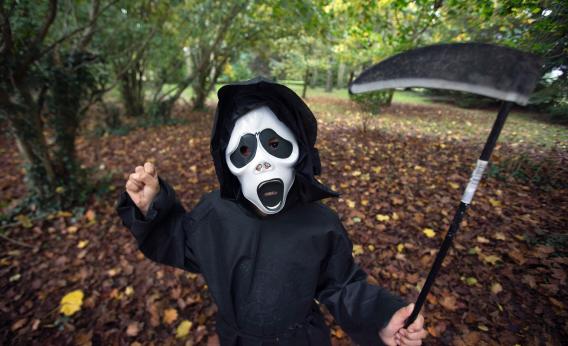Explainer’s Trick-or-Treat Roundup
Your Halloween-related questions, with answers from our archives.

Photo by Joel Saget/AFP/Getty Images.
Tis’ the night in which things go bump, including your Halloween-themed questions. But fear not! Explainer is here to dispel your seasonal curiosities with answers from years gone by.
My kid brought in a massive haul of Halloween candy this year. Can it ever go bad?
Yes, but it might last until next Halloween or beyond. Candy bars are high in sugar and low in moisture, both of which help to prevent microbial growth. Pure chocolate can last for two years or more without presenting any acute health risks, but it’s likely to change in texture and become less appetizing after about 12 months. Given enough time, some bars could even become so dry and hard as to be inedible (or at least a danger to your teeth). More serious, nondental health risks are very unlikely, however. (Read more on candy expiration dates.)
A gaggle of sexy schoolgirls and naughty nurses just walked by—when did Halloween costumes become so tawdry?
In the 1970s. Costuming has been a part of Halloween since at least the 19th century, when Scottish and Irish children went "guising" house-to-house in exchange for coins. The Victorians enjoyed a good costume ball on Halloween, and some daring get-ups, like Gypsy outfits, were popular. But risqué costumes were not pervasive until right around Gerald Ford's presidency, when homosexual communities in the United States adopted Halloween as an occasion for revealing, over-the-top attire. (Read more on sexy Halloween costumes.)
It looks like people are still wearing those Hillary Clinton masks this year. Couldn’t she sue to force companies to stop making them?*
Not really. She and her lawyers could make a case, but it's hard for public figures like politicians to sue and win in these situations. Depending on state laws, private individuals can control how their image is used under the "right of publicity," the legal principle that applies if someone uses your name or likeness to sell a product. (For example, a Texas teenager has sued Virgin Mobile for using a picture of her without permission in an Australian advertising campaign.) But when it's a politician or other prominent public figure, the right of publicity comes into conflict with the First Amendment, and our right to speak about—and mock—our leaders. (Read more about costumes inspired by public figures.)
I realize the ghosts in American Horror Story are far more eloquent, but back in my day, spirits just said “boo!” Where does that word come from?
Ghosts were saying "boo!" by the middle of the 19th century, though the exclamation had been used to frighten English-speaking children for at least 100 years before that. Perhaps the first appearance of boo in print comes from the book-length polemic Scotch Presbyterian Eloquence Display’d (1738), in which author Gilbert Crokatt defines it as , “a word that’s used in the north of Scotland to frighten crying children.” (It's not clear why people in Scotland would want to frighten a crying child.) The verbal tactic had been adopted by proper ghosts—and people with sheets on their heads—by the 1820s at the latest. (Read more about the etymology of boo.)
*Correction, Nov. 1, 2012: This article originally spelled Hillary Clinton's first name as "Hilary." (Return to the corrected sentence.)